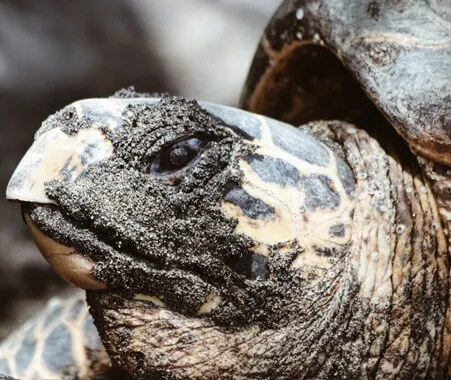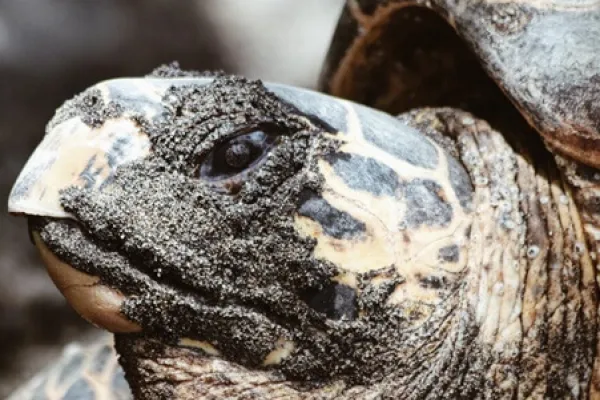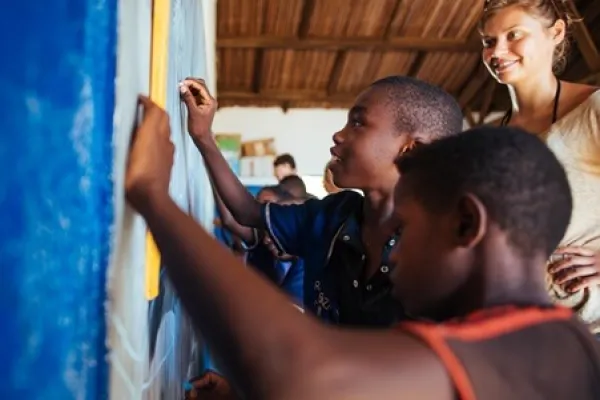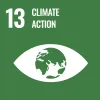Overview
Be a volunteer for the Sea Turtle Monitoring Volunteer Program in Madagascar with Volunteering Solutions, and assist the staff in identifying nesting areas by visiting remote beaches on islands surrounding the island of Nosy Be. This program gives volunteers the opportunity to get up close to these beautiful creatures whilst helping to ensure the health and survival of the species into the future.
Two species of turtle are monitored; the critically endangered Hawksbill Sea Turtle (Eretmochelys imbricata) and the endangered Green Sea Turtle (Chelonia mydas). The Sea Turtle Monitoring Program runs year-round with the focus of the program shifting depending on the season. During the nesting season from November to April each year, when turtles come ashore to lay their eggs, the project focuses on preventing the poaching of mothers and nests, collecting data on the nesting turtles and their eggs, and moving nests that have been laid in locations that are unsuitable for hatching success.
During the off nesting season, from May to October, you will be assisting us in establishing areas of turtle activity, identifying population size and re-establishing nesting beaches. When tides allow, you will also be conducting seagrass surveys, turtle watches and beach cleans.
Currently, large numbers of turtle eggs are being plundered on many of the remote beaches, and hatchlings and fully reproductive turtles are shockingly being harvested for the souvenir trade. Due to the already naturally low survival rate of turtle hatchlings, this is having devastating impacts on population numbers.
You will be a part of creating a new research database in a relatively unstudied area. You will be out searching for signs of turtle activities most days and many nights. If we find turtles or eggs during our surveys, you will also get the opportunity to handle these animals as part of the data collection process.
Volunteers in this program gain the following skills -
Visual encounter surveys
Animal Handling experience (only in nesting season)
Track surveys
GPS use
Turtle Identification techniques
Scientific data collection
Data processing and analysis
Nosy Komba Activities
Active Turtle Surveys (ATS) and Facial Recognition Project – Volunteers conduct snorkelling-based turtle surveys in the bay in front of Turtle Cove. They identify and photograph turtles, collect data on species, size, behaviour, and habitat use, and contribute to the ‘In-Water Turtle Sightings’ database. Volunteers will also use the images of turtle facial patterns to help build a local and global database on the Internet of Turtles to allow researchers to track population trends and movement patterns over time.
Seagrass Monitoring – Volunteers survey seagrass meadows, a vital foraging ground for Green Turtles, assessing density, health, and biodiversity to monitor environmental changes affecting marine ecosystems.
Beach & Ocean Cleans – Regular coastal and snorkelling-based clean-ups help remove marine debris and plastic pollution from turtle habitats. Data is logged in the ‘CleanSwell’ app to contribute to global waste research.
Artificial Reef (AR) Construction & Coral Planting – In collaboration with the Marine Conservation Program, volunteers engage in artificial reef maintenance and out-of-water coral planting sessions, learning coral restoration methodologies.
Self-Directed Learning & Lectures – Volunteers participate in workshops and discussions covering topics such as Turtle biology, physiology, and behaviour, Marine ecology & conservation strategies, Waste management & ocean pollution,Coral reef restoration techniques,Climate change, El Niño, and human impacts on marine ecosystems.
Eco-Bricks & Waste Management – Volunteers repurpose non-recyclable plastic into eco-bricks for sustainable construction projects, reducing waste and promoting environmental responsibility.
Bamboo Straws Project – To combat single-use plastics, volunteers harvest and craft bamboo straws, distributing them to local businesses and communities as a sustainable alternative.
Malagasy Language & Cultural Lessons – Volunteers have the opportunity to learn Malagasy, improving communication with local community members and conservation partners.
Scientific Paper Group Discussions – Volunteers analyze and discuss new marine conservation research, exploring how findings can be applied to MRCI’s conservation strategies.
Ampohana Activities
In Ampohana, in addition to the above activities, volunteers take part in specialised nesting and community engagement projects:
Beach Patrols for Nesting & Hatching Turtles – Volunteers conduct hourly patrols during high tide to identify new turtle nests, monitor nesting behaviour, and protect hatchlings.
Turtle Nesting Observations & Data Collection – Volunteers assist in recording species, nest location, environmental factors, and predation risks, sharing data with the Olive Ridley Project and Wildlife Conservation Society.
Turtle Tracking Skills – Volunteers learn to identify and interpret animal tracks from turtles, crabs, dogs, and other wildlife, essential for nesting site monitoring and habitat protection.
Turtle Nest Excavations & Hatchling Success Surveys – After hatchlings emerge, volunteers conduct nest excavations to record hatching success rates, deformities, and evidence of predation.
Turtle Nest Protection – Volunteers take an active role in protecting nests, which may include constructing barriers, monitoring temperature conditions, and relocating at-risk nests.
English Teaching & Marine Biology Lessons – At the Ampohana school, volunteers teach English with a marine conservation focus, raising awareness about turtle conservation, marine ecosystems, and sustainability.
Nesting Activities on Nosy Komba When Needed
While most turtle nesting activities occur in Ampohana, when we receive reports of nesting turtles or active nests on Nosy Komba, volunteers will conduct nesting surveys, data collection, and protection efforts there as well. This ensures that conservation work is not restricted to a single location and can respond dynamically to turtle activity in the region.
For those who love to be surrounded by animals and are keen to volunteer for the well-being of the turtles, there can be nothing better than this!
Volunteer Work Schedule
Volunteer Work Schedule
Volunteers usually arrive on Sunday and the program will start from Monday.
Monday
07:30 Breakfast
08:30 Orientation Presentation
10:00 Health and Safety Presentation
11:00 Complete and sign forms and paperwork
12:00 Lunch
14:00 Walk to the neighboring village of Ampang for a tour led by staff
17:00 Return to camp (walk or by boat at a cost of 2,000 MGA/person)
18:00 Dinner
18:45 Daily Board Briefing
Tuesday: First official day on project! Generally, you will be doing hands-on activities integrated with staff and other more experienced volunteers. Staff will go over activities and times after dinner on Monday so you know where to go.
Volunteer Activities:
Each program has morning and afternoon activities. After dinner each day, we have a briefing to go over activities for the following day.
Note: Schedule will vary depending on the project, tides, etc.
Sample Schedule:
05:00-07:00 Breakfast on camp
06:00-08:00 Start of morning activities on the project
12:00 Lunch on camp
14:00 Start of afternoon activities on the project
16:00-17:00 Volunteer activities for the day usually conclude
18:00 Dinner in the camp
18:45 Board Briefing to go over activities for the following day
Volunteer Roles & Responsibilities
Volunteer Roles & Responsibilities
Being a volunteer for this program, you'll be mostly assigned the following work:
To map and identify beaches used as nesting sites
To identify species diversity and numbers
To engage and establish a relationship with the local communities enabling us to include them in our conservation efforts
To monitor and remove plastic waste and other harmful products from the beaches
Apart from that, identifying and implementing protection measures for these breeding sites is paramount to safeguarding the species in this area. You'll be guided by the Project Coordinator from time to time, and oriented about the work that has to be done.
The following Program Activities are undertaken in the program -
Turtle Watch
Seagrass Snorkelling Surveys
Active Turtle Survey (ATS’s)
Beach Cleanups
Eco Bricks making
Community Engagement
Project Requirement
Project Requirement
If you plan to volunteer in Madagascar, you need to be at least 18 years old. There might be exemptions if you can provide the permission of your legal guardian(s) or if you are accompanied by your parents. Volunteers should be highly energetic; have a positive attitude to make a change; possess a certain level of fitness, since island life is not as easy as it might seem! Volunteers joining the Sea Turtle Monitoring Program should have a keen interest in conservation and research.
Schedule a Google Meet with a Program Advisor
Interested in our programs? We're here to provide expert guidance
- Get Detailed Info
- 20 min One -on-One meeting
- Get expert advise
- Application Guidance
Photo Gallery
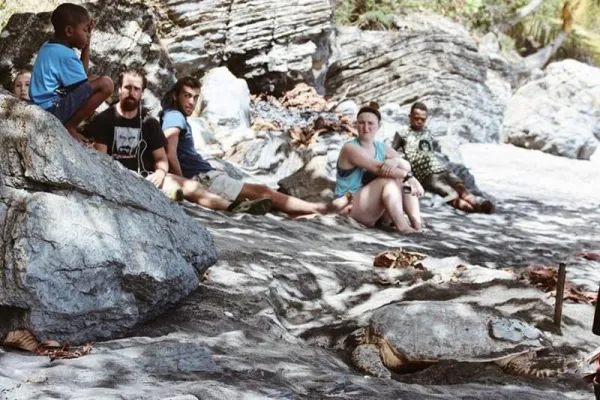
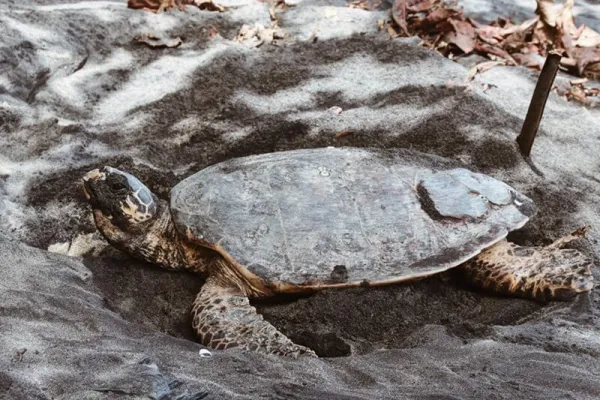

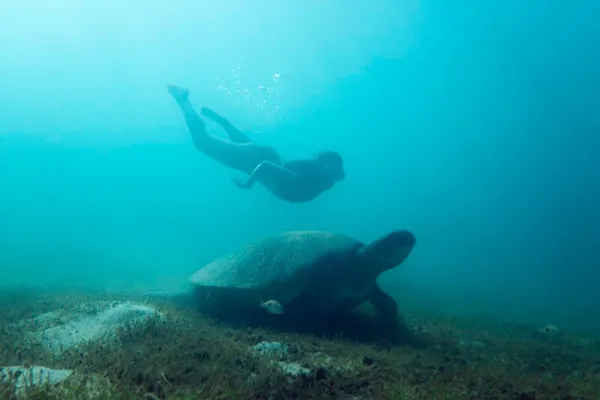
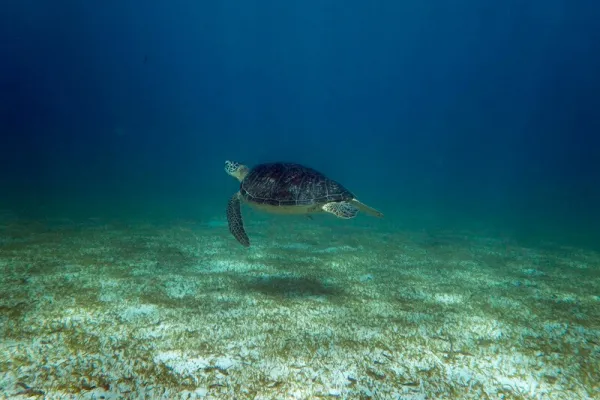
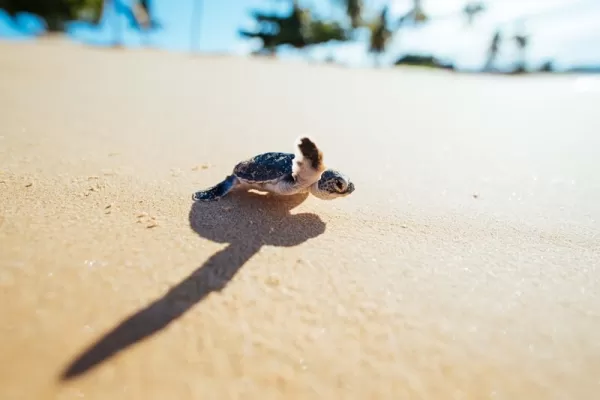
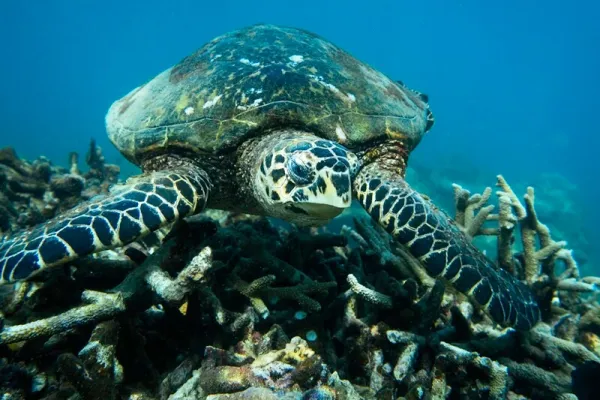
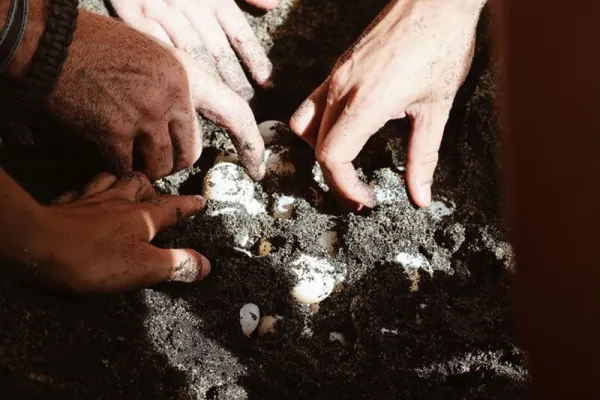








Living
Living
Airport Transfer
Volunteers should arrive at Nosy Be Fascene Airport for pick-up on Sunday before their start date. They will be met at the airport or boat port (if arriving overland) and transferred to the volunteer camp on Nosy Komba. The boat ride from Nosy Be to Nosy Komba takes about 45 minutes with the last boat of the day departing around 15:00. If volunteers do not arrive in time for the last boat to camp, our staff will assist in getting them to their hotel (we can provide hotel recommendations). The following day they will be met at a predetermined time and place and transferred to the camp. If there is time before the last boat departs for Nosy Komba, our staff will give them a tour of the town of Hellville where they can purchase snacks, a local SIM card, draw money at an ATM, etc. It is important to note that in addition to time constraints with boat departures and tides, shops and stores all close for siesta between noon and 14:30/15:00 each day.
For your departure: You are responsible to arrange and pay for your own transport back to the airport, however, we are happy to help you book your transport as needed.
Accommodation
We have 2 accommodation facilities in Madagascar. The first one, Turtle Cove, is built into the steep slopes of Nosy Komba, which is a multi-level compound overlooking the spectacular coral reef below. Climb stone stairs up from an idyllic beach to the main house situated above the dive deck and take in the stunning view of the ocean extending far across all the way to Lokobe Forest Reserve on Nosy Be. The main house accommodates senior staff members and serves as a meeting place and hangout for volunteers during the day. Large decks line the front of the main house complete with hammocks, bean bags, and benches.
Volunteers can expect to share a hut with four to six other volunteers and will need to bring their own bedding and towels. The huts have several bathroom facilities equipped with running water, flush toilets and cold water showers. There is also a work area for volunteers as well as lockable storage boxes available for each hut to store small valuables. Volunteers should also bring a padlock to secure personal items in their luggage when not in use.
The second camp is located on mainland Madagascar in the small remote village of Ampohana. Volunteers are accommodated in communal A-Frame bungalow fitted with double bunk beds. Our camps are eco-friendly with solar-powered lighting throughout. There are no charging facilities for electronic devices; volunteers are encouraged to bring a solar panel and battery pack to keep their devices charged. Charging ports are available in the neighboring village of Ampang, about a half-hour hike from camp.
We do have an onsite generator for staff use located at our main camp, though volunteers are welcome to charge small devices (no laptops) from this if there is space. Bear in mind that in an effort to go green, the use of the generator is minimal, sometimes only once per week or less.
Wi-Fi is not available on camp, however, there is Wi-Fi access in the neighboring village of Ampang, about a half-hour hike from camp. Volunteers can purchase a local sim card in Hellville along with 2GB of data for $5. Please ensure that your phone is unlocked and sim card compatible.
A hand-washing laundry station is provided on camp with a clean water tap, a concrete work surface for scrubbing, and buckets. Volunteers will need to purchase their own laundry soap (available in neighbouring Nosy Be) and can either do their own washing or pay one of the local kitchen or caretaker staff to do it for them.
It'll be great fun to live this life away from the network, where you'll get ample time to bond with your fellow mates, share your stories and plan out how to make a difference.
Meals
Three meals per day are provided seven days per week. Each meal is prepared by our on-site cooks using traditional Malagasy cooking methods using fresh, locally grown, seasonally available produce. Most meals have a rice base with beans and vegetables on the side (or over rice).
Fruits and vegetables served will change depending on the season and availability of local produce. Some meals will include fish/seafood, beef (zebu), or chicken. Meat, when part of a meal, is typically prepared with a sauce, cut into small pieces, and served over rice. In addition to bananas, breakfast usually consists of either baguettes and jam, eggs or crepes.
There is a vegetarian option for all meals. Due to logistics and the limitations of our remote location, we cannot provide a vegan option. Vegans can help themselves to the vegetable-based foods prepared, but will also need to supplement their diet with foods purchased off camp. If you have special dietary requirements, please let us know. We will do our best to provide accordingly, however you should not expect to eat as you normally do at home.
Know that you are volunteering in a remote region of a developing country and flexibility is necessary.
During your Free Time
A few popular weekend activities/places to visit are listed below.
- Lokobe Forest Reserve
- Discovery SCUBA Dive
- SCUBA Dive Training
- Explore different areas of Nosy Komba with a local guide and learn about medicinal plants, the endemic wildlife and more
- Tanikely Natural Reserve
- Visit Nosy Iranja or Nosy Sakatia (swimming and snorkeling)
- Whale Shark Watching (seasonal)
- Visit the Sacred Tree or Sacred Waterfall on Nosy Be
- Hike up Mount Passot on Nosy Be
- Visit Lemur Land park on Nosy Be, or the Lemur Park on Ampang Village on Nosy Komba
- Ankarana National Park
- Amber Mountain National Park
- Visit plantations on the mainland in the city of Ambanja
- Visit the city of Diego Suarez including the Emerald Sea, the Three Bays, Tsingy Rouge rock formation and more
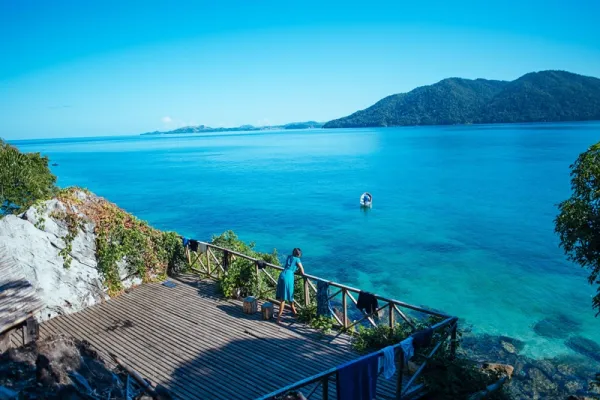
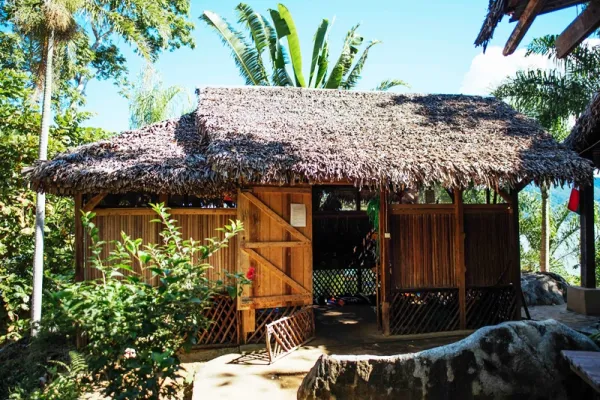
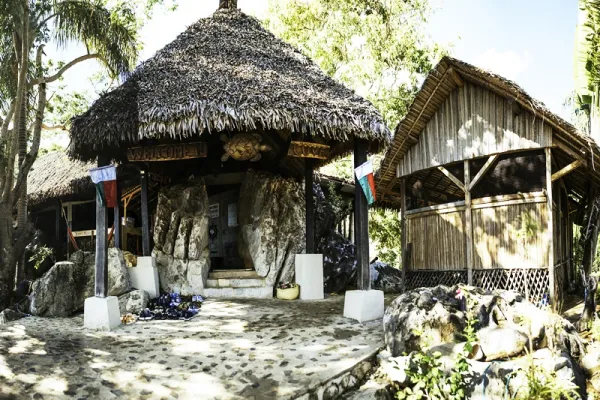
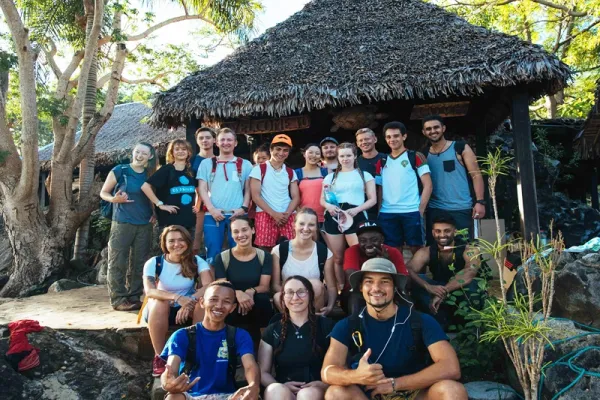

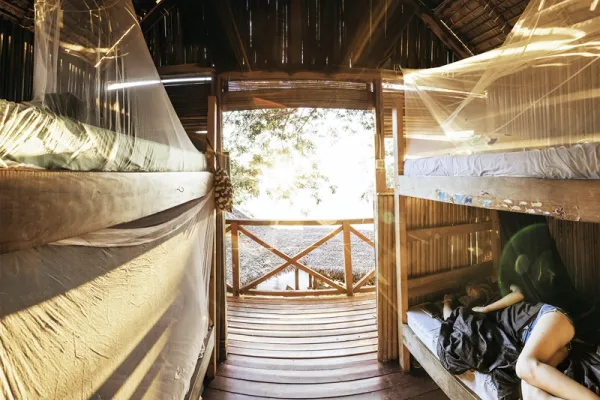
Dates
Dates
January
05
19
February
02
16
March
02
16
April
06
20
May
04
18
June
01
15
July
06
20
August
03
17
31
September
14
October
05
19
November
02
16
30
December
14
January
04
18
February
01
15
March
01
15
April
05
19
May
03
17
30
June
14
July
05
19
August
02
16
September
06
20
October
04
18
November
01
15
December
06
20
Available
Filling Fast
Booked Out
Costs
| Duration |
Program Fee
|
Choose your currency
|
|---|---|---|
| 1 Week | $510 | |
| 2 Weeks | $770 | |
| 3 Weeks | $1040 | |
| 4 Weeks | $1345 | |
| 5 Weeks | $1645 | |
| 6 Weeks | $1925 | |
| 7 Weeks | $2225 | |
| 8 Weeks | $2500 |
Please Note: An application fee of is charged over and above the program fee as an application payment. A 5% international banking fee is charged for credit card payments of program fee in USD/AUD.
What are you Paying For?
- 24 hrs Assistance and support from staff
- Comprehensive Pre- Departure Information
- Orientation
- Sleeping accommodation on camp for the program duration
- Three meals per day, seven days per week on camp
- Supervision and training by staff
- Airport pick-up in Nosy Be
- Transportation to program sites
- Travel & Medical Insurance (Available at an extra cost)
- Certificate of Participation(On Request)
What's NOT Included?
- Flights
- Visa costs
- Personal items
- Travel and health insurance
- Airport drop-off
FAQ's
Flights and Visa
-
Can I know more about the flights and Visa?
-
Volunteers may fly directly into Nosy Be Fascene International Airport (airport code NOS), or into the capital city, Antananarivo (Tana for short; airport code TNR). If you fly into Tana, you can take a domestic flight from Tana to Nosy Be, or travel overland via Taxi Brousse or private car to Nosy Be. We can help arrange your overland transport if needed.
All visitors require visas and a one to two-month single entry visa may be obtained on arrival at the airport. This may be extended to in-country to a maximum of three months. We do recommend you check with the Consulate General as visa requirements can change at any time. A passport valid for 6 months after the date of return is required. Please ensure you have at least two blank pages available in your passport before the commencement of travel.
Application and Program Details
-
Can I volunteer as part of a group?
-
Yes, you are welcome to take part in the Programs in Madagascar as part of a group. We welcome families, friends, high school students, college/university and corporate groups to volunteer in Madagascar programs together.
-
How do I get to the program location?
-
The in-country coordinator will guide & assist you reach the program location, on the first day of the program.
-
When should I apply for the volunteer programs in Madagascar?
-
As we have limited spots available in our programs and we serve on a first come first basis, it is strongly recommended to apply for the program and reserve your spot in the program well in advance. You can book your spot in the program by filling an online form and pay the application fee.
Once you complete your application, your individual 'My Account' will be active in which you will receive your placement confirmation after which you can pay the program fees. You can pay the program fees later as well in installments, but 45 days before the program starts. -
How long will it take to process my application? Will my application be accepted?
-
After you complete your application, your personalized ‘My Account’ will be active. You will need to upload your CV/Resume along with your photo in the same. Our backend team and the placement site takes around 10-12 days to review your application. After we review your CV and documents, your booking is confirmed and booking confirmation is updated in your ‘My Account’.
-
I haven’t traveled or volunteered abroad before. Can I still be a part of VolSol?
-
Yes, most definitely you can as we believe every participant brings something new to the project. If you do not have previous experience, we offer you the opportunity to have a great start with us. We make international volunteering easy – not only are our Volunteer Abroad opportunities rooted in offering you extensive support, but they are also very affordable.
-
Are there any necessary requirements to participate in the programs?
-
- You must be respectful towards the people living on the island
- You must be tolerant towards others and respect the differences
- You must welcome teamwork but also be able to work alone
- You must be at least 18 years old
- You have to be a proactive person, we welcome volunteers with initiative and creativity
- You must have at least an Intermediate level of English
-
Does VolSol provide a reference or a certificate after program completion?
-
Yes, we will provide you with the Certificate after successful completion of your program. The certificate is provided on request.
Health and Safety
-
Can I know more about the vaccinations required?
-
The https://wwwnc.cdc.gov/travel/destinations/traveler/none/madagascar"; target="_blank">CDC recommended the following vaccinations for travelers visiting Madagascar: hepatitis A, hepatitis B, typhoid, yellow fever, rabies, meningitis, polio, measles, mumps and rubella (MMR), Tdap (tetanus, diphtheria, and pertussis), chickenpox, shingles, pneumonia, and influenza.
-
Why should I volunteer in Madagascar?
-
Well, we believe you need no reason to be a part of something incredibly meaningful, such as volunteering in Madagascar. However, in case you are still wondering why you should be a part of this journey, here are a few reasons that would possibly convince you to join us.
It'll be a golden opportunity for you to take a closer look at nature and understand how the flora & fauna of this island has evolved over time, disconnecting from the rest of the world.
You'll get to work with professionals and gain some valuable surveying skills.
In case you join the Marine Conservation Program, you'll get a PADI certificate that'll benefit you in the days ahead as well.
You'll get to meet some amazing people from different parts of the world, and experience an amazing exchange of skills and thoughts.
If you are keen to learn and experience something new, then there can be nothing better than this!
Connect with Past Volunteers
-
How can I connect with past Volunteering Solutions alumni as well as other former and current volunteers?
-
We encourage volunteers to get in touch with former Volunteering Solutions participants and also other program participants joining our projects. You are recommended to join the https://www.facebook.com/VolunteeringSolutions/"; target="_blank">Volunteering Solutions Facebook Page or https://www.facebook.com/groups/volunteeringsolutions/"; target="_blank">Facebook Group to communicate with other participants.
To read alumni interviews from past participants, visit the https://www.volunteeringsolutions.com/meet-a-volunteer"; target="_blank">Meet a Volunteer page on our website.


























